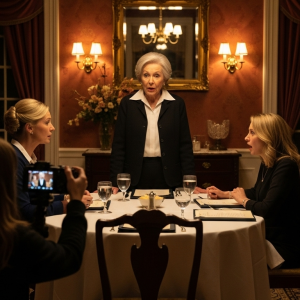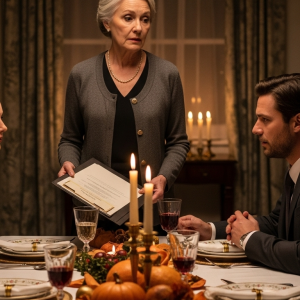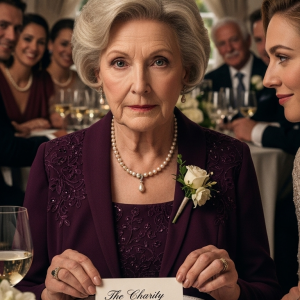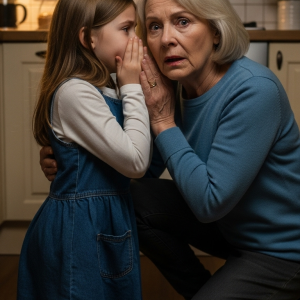The silence in our home had become a living thing. It was a heavy, suffocating presence that sat between my husband, Khai, and me at the dinner table, that followed us into separate rooms, and that lay in the cold, empty space between us in bed. For nearly a year, since my diagnosis, this silence had been growing, feeding on unspoken fears and resentments.
It had started with a lump in my throat, a persistent fatigue that I, Hanh, had dismissed as the stress of a demanding job. But the biopsy results were unequivocal: a thyroid tumor. While not malignant, it was large and aggressive, requiring surgery and a long, uncertain recovery.
I remember the day I told Khai. We were in the kitchen, the late afternoon sun slanting across the floor. I watched his face as I explained the doctor’s words. I was looking for comfort, for a hand to hold, for the reassurance that we would face this together. Instead, I saw a flicker of something else in his eyes: annoyance. Impatience.
“So, more doctors’ appointments?” he’d asked, his first question not about my health, but about the inconvenience to our schedule. “How long will you be out of commission?”
That was the beginning of the end, though I refused to see it then. I spent the next several months trying to be the perfect patient, the perfect wife. I downplayed my exhaustion, forced smiles when waves of nausea hit, and made sure his favorite meals were on the table, even on days when the thought of food made my stomach churn. I was trying so hard to not be a burden, desperate to prove that I was still the capable, “good enough” wife he had married nearly ten years ago.
But his distance grew. He started working late more often, his excuses becoming more and more flimsy. There were hushed phone calls he would take in the other room, the faint scent of a perfume that wasn’t mine clinging to his clothes when he finally came home. The silence in our house was no longer empty; it was filled with the ghost of another woman.
The week before my surgery, I knew I couldn’t live in denial any longer. I went to see my oldest and dearest friend, Dr. Quan, the very man who would be performing my operation. We sat in his quiet office after hours, the city lights twinkling outside.
“He’s having an affair, isn’t he?” I said, the words tasting like ash in my mouth. It wasn’t a question.
Quan didn’t insult me with false reassurances. He simply nodded, his expression a mixture of profound sadness and protective anger. “I’m so sorry, Hanh.”
Tears I had been holding back for months finally fell. “He thinks I’m weak, Quan. He resents me for being sick.” I took a shaky breath, a new, cold resolve hardening in my chest. “And I think… I think he’s going to use this surgery as his opportunity. When I’m at my weakest.”
I handed him a thick manila envelope. “These are from my lawyer. Divorce papers. I’ve already signed them. They outline a fair division of our assets, one that I am content with.”
Quan looked at the envelope, then back at me, his eyes full of concern. “Hanh, what are you asking me to do?”
“Keep them for me,” I said, my voice steady now. “After my surgery, if Khai comes to the hospital… and if he brings his own papers… I want you to let him. Let him have his moment. Let him think he’s in control.” I met his gaze, my own eyes clear and determined. “And after he leaves, I want you to bring me these. Because I will not be the woman who was abandoned on her hospital bed. I will be the woman who was already waiting with the pen.”
The seventh-floor patient room was strangely quiet, the sounds of the bustling private hospital muffled by the closed door. The heart monitor beeped in a steady, reassuring rhythm, a stark contrast to the chaos brewing within me. The fluorescent lights overhead shone down on my pale face. I had just survived the surgery, but a different kind of trial was about to begin.
Through the hazy fog of the lingering anesthesia, I saw a figure standing at the head of my bed. It was Khai. He wasn’t holding my hand or a bouquet of flowers. He was holding a stack of papers.
“You’re awake?” he said. His voice was cold, clipped, utterly devoid of warmth or concern. “Good. Sign here.”
My mind was sluggish, my thoughts swimming. “What… what is it?” I rasped, the words scratching against my raw, sore throat.
Khai pushed the papers toward my face, his movements sharp and impatient. “Divorce papers. I’ve already had them drawn up. Just sign, and it’s done.”
The fog in my head evaporated, replaced by a shock so profound it felt like a physical blow. My lips moved, but no sound came out. The pain from the incision in my neck was a dull throb, nothing compared to the sharp, searing agony in my heart. My eyes filled with a mixture of pain and disbelief.
“Are you… joking?” I finally managed to whisper.
“I’m not joking,” he said calmly, as if he were discussing a simple business transaction. “I told you, Hanh. I can’t live with a weak, sick woman who is a drain on me all year round. I’m tired of carrying this burden alone. You should be happy for me. I deserve to live with my true feelings, with someone who makes me happy.”
He spoke with such casual cruelty, as if he were talking about changing internet providers, not abandoning the wife who had dedicated nearly a decade of her life to him. A faint, bitter smile touched my lips, and tears began to flow silently from the corners of my eyes, tracing paths down my temples.
“So… you waited,” I said, my voice a broken whisper. “You waited for the moment I was physically helpless, unable to move, unable to even react properly… to force me to sign this?”
Khai was silent for a few seconds, then gave a small, unapologetic nod. “Don’t make this dramatic. This was always going to happen, sooner or later. I’ve met someone else, Hanh. And she doesn’t want to live in the shadows anymore.”
I bit my lip, hard. He had just confirmed everything. But I refused to give him the satisfaction of a scene. I would not scream or cry or beg. I looked at him, my gaze steady despite the tears.
“Where is the pen?” I asked softly.
Khai was visibly surprised. A flicker of confusion crossed his face. “You… you’ll actually sign? Just like that?”
“Didn’t you just say it?” I replied, my voice gaining a sliver of strength. “This had to be done, sooner or later. Let’s not prolong the inevitable.”
He fumbled in his jacket and produced a sleek, expensive-looking pen, placing it in my hand. My fingers, trembling slightly from the anesthesia and the emotional shock, closed around it. With slow, deliberate movements, I signed my name on the line he indicated.
“Done,” I said, my voice clear. “I wish you happiness, Khai.”
“Thank you,” he said, already gathering the papers, his relief palpable. “The property will be divided as agreed. Goodbye, Hanh.”
He turned and left without a backward glance. The door closed behind him with an eerily soft click. The beeping of the heart monitor was the only sound in the room. I was alone. But for the first time in a very long time, I did not feel lonely.
Less than three minutes later, the door opened again. This time, it wasn’t my husband. It was my friend.
Dr. Quan walked in, his surgeon’s scrubs replaced by a crisp shirt and trousers. In one hand, he carried my medical chart, and in the other, a large bouquet of pristine white roses.
“I heard a nurse say Khai was just here?” he asked, his voice gentle, his eyes scanning my face for any sign of distress.
I nodded, offering him a small, genuine smile. “Yes. He came to get his divorce papers signed.”
Quan’s expression hardened for a moment before softening with concern. “Are you okay?”
“I’m better than I have been in years,” I said, and the truth of that statement resonated deep in my soul.
He sat down in the chair Khai had so recently vacated, placing the beautiful flowers on the bedside table. Then, he quietly handed me the manila envelope I had given him a week ago.
“This is the copy of the divorce papers your lawyer sent me,” he said. “You told me that if Khai submitted his papers first, I should give these to you to sign.”
I opened the envelope and, without a moment’s hesitation, signed my name again, my signature firm and steady this time. I turned to look at Quan, my eyes feeling brighter and clearer than they had in a very long time.
“From this moment on, I am not living for anyone else,” I said, the words a vow to myself. “I don’t have to force myself to be a ‘good enough’ wife. I don’t have to pretend I’m okay when I’m tired and in pain. I am finally free.”
Quan reached out and gently squeezed my hand. “I am here, Hanh,” he said, his voice full of a quiet, unwavering loyalty. “Not to replace anyone. Just to be here for you, if and when you need a friend.”
I nodded, a single tear falling from my eye. But this tear was not born of pain or heartbreak. It was a tear of pure, unadulterated relief.
Khai left the hospital feeling a lightness he hadn’t felt in years. It was done. The anchor of his sick, unhappy wife was finally cut loose. He got in his car and immediately called Linh, his new partner.
“It’s over,” he said, a triumphant smile spreading across his face. “She signed. No drama, no hysterics. It was easier than I thought.”
“Oh, darling, that’s wonderful!” Linh’s cheerful voice came through the speaker. “I’ll open that expensive champagne you bought. We have a new life to celebrate!”
That evening, they toasted to their future in his and Linh’s sleek, modern apartment—the one he had secretly been paying the lease on for six months. He felt powerful, in control. He had orchestrated his exit perfectly, minimizing the mess and securing his freedom. He had won.
A week later, an express mail package arrived for him at his office. He assumed it was a final settlement document from his lawyer. He opened it casually, only to find a fully executed divorce decree from the court. It was official. He was a free man.
Tucked inside the legal documents was a small, cream-colored note card. He recognized the elegant, familiar handwriting immediately. It was from Hanh.
“Khai,” it read.
“Thank you for choosing to leave, because it finally gave me the permission to no longer hold on to someone who had already let go of me long ago.
I want you to understand something. The one who was left behind today is not me.
It is you. You have forever lost someone who once loved you with every single piece of her heart. And you will never get that back.”
Khai read the note once, then twice. A cold dread, heavy and sickening, began to pool in his stomach. This wasn’t the note of a victim. It was the note of a victor. The calm way she had signed the papers, her quiet “I wish you happiness”—it hadn’t been defeated acceptance. It had been a dismissal.
He suddenly understood. He hadn’t cornered her. He hadn’t forced her hand. He had simply walked into a scenario she was already prepared for, a conclusion she had already reached on her own. He thought he was the one leaving, but in reality, she had already left him months ago. The man who thought he held all the power was, in the end, the one who had been mercilessly, and quietly, abandoned. The champagne he had celebrated with suddenly tasted like ash in his mouth.
Six months later, the winter sun streamed into a bright, airy apartment overlooking a small city park. The walls were lined with books and canvases, some finished, some in progress. The scent of coffee and oil paint hung in the air. Hanh stood in the center of the room, her hair grown back, a faint, silvery scar on her neck the only visible reminder of her ordeal.
She was laughing, a sound that was full and genuine. Quan sat across from her at a small dining table, a chessboard between them.
“Checkmate,” he said with a grin. “Again.”
“You cheat,” she retorted, her eyes sparkling. “You’ve been practicing.”
Their friendship had been her anchor during her recovery. There was no romance, not yet, perhaps never. There was simply a deep, abiding loyalty and an easy comfort that was more healing than any medicine. He had been there for every follow-up appointment, had helped her move into her new place, and had reminded her how to laugh.
Later that evening, after Quan had left, Hanh stood in front of her bathroom mirror. She gently traced the scar on her neck. For months, she had seen it as a mark of betrayal, a symbol of the day her husband had tried to break her.
But now, she saw it differently. It wasn’t a brand of weakness. It was a medal. It was the proof that she had been cut open, had a part of herself removed, and had not only survived but had emerged stronger, lighter, and more herself than she had been in years.
She was no longer Khai’s sick wife, a burden to be carried. She was Hanh. An artist. A survivor. A woman who, in her darkest moment, had found the strength to pick up her own pen and sign her own declaration of independence. And her new life was just beginning.




